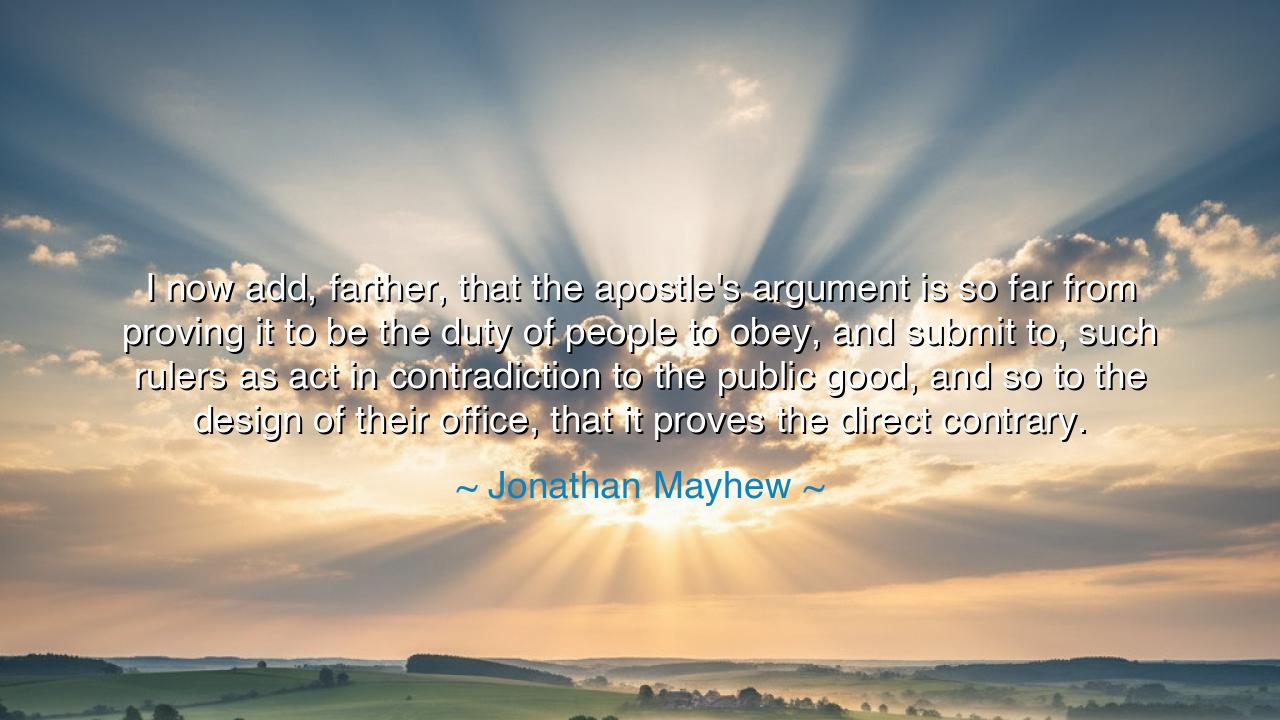
I now add, farther, that the apostle's argument is so far from
I now add, farther, that the apostle's argument is so far from proving it to be the duty of people to obey, and submit to, such rulers as act in contradiction to the public good, and so to the design of their office, that it proves the direct contrary.






“I now add, farther, that the apostle’s argument is so far from proving it to be the duty of people to obey, and submit to, such rulers as act in contradiction to the public good, and so to the design of their office, that it proves the direct contrary.” Thus spoke Jonathan Mayhew, the fiery preacher of eighteenth-century Boston — a voice whose words blazed like a torch in the gathering darkness before the dawn of liberty. In this declaration, Mayhew called forth the ancient spirit of justice, proclaiming that obedience to tyranny is not righteousness, but the betrayal of divine order itself. His message was not rebellion for rebellion’s sake, but a cry for the restoration of true authority, one that serves the public good and honors the sacred trust between ruler and people.
The origin of this quote lies in a sermon preached in 1750, on the anniversary of the death of King Charles I — a monarch whose pride led him to trample the rights of his people. Mayhew, a minister of the Gospel, dared to challenge the common interpretation of Romans 13, a passage many had used to demand blind obedience to kings. But Mayhew, with the discernment of a prophet, declared that the apostle Paul did not bless tyranny; rather, he blessed just government, founded upon virtue, equity, and the welfare of all. Thus, Mayhew’s voice became one of the first to awaken the conscience of a nation yet unborn — the voice that would whisper freedom into the hearts of patriots like Adams and Jefferson.
In this saying, Mayhew reminds us that authority divorced from justice is not authority but usurpation. A ruler who serves only himself, who acts “in contradiction to the public good,” breaks the very covenant that grants him power. To obey such a man is not obedience to God, but disobedience to truth. This was the wisdom of the ancients — that kings and magistrates were not gods, but servants of the law. The Greeks called it nomos, the Romans lex, and the prophets of Israel called it righteousness. The law stands above the throne, and any ruler who acts against it dethrones himself by his own hand.
Let us recall a story from the annals of old — the tale of Brutus, who struck down the tyrant Tarquin and restored the Roman Republic. It was not cruelty that guided his hand, but devotion to the public good. For when Tarquin defiled the people and enslaved their freedom, he ceased to be a king and became a wolf among sheep. Brutus understood that loyalty to a tyrant is treason to mankind. And though his act was harsh, it preserved liberty for generations. So too did Mayhew proclaim that resistance to tyrants is obedience to God, a truth that later became a rallying cry of the American Revolution.
Mayhew’s teaching burns with moral fire: that obedience is sacred only when authority is just. The people, though humble and peace-loving, bear within them the divine duty to preserve justice when it is imperiled. Submission to wickedness is not humility but cowardice. A free people must be guided by conscience, not fear; by reason and faith, not by decrees of corruption. For to bow before unrighteous rule is to deny the dignity of the soul, which God Himself has made free.
The lesson, then, is one of discernment and courage. Let every man and woman ask: whom do I obey — truth or tyranny? When the voice of power commands what is wrong, righteousness demands refusal. Yet rebellion must not be born of hatred, but of love for the common good. The sword of justice must be wielded not in rage, but in reverence for that higher order which sustains all nations — the moral law, which no throne may overturn.
Therefore, let the generations remember Jonathan Mayhew not merely as a preacher, but as a guardian of conscience. His words remind us that liberty and virtue are woven together, and that one cannot live long without the other. The people are not the slaves of rulers, but the stewards of justice. When authority becomes corruption, when power becomes oppression, it is not only the right but the duty of the people to resist — to stand, as Mayhew did, for truth against the tyranny of men.
And so, dear listener, walk with open eyes and steadfast heart. Honor rulers who serve the public good, but never bow to those who betray it. Speak when silence would nourish deceit. Act when fear would hold you still. For as Mayhew taught, to obey righteousness is to obey God — and to defend the good of all is the truest worship of Heaven.






AAdministratorAdministrator
Welcome, honored guests. Please leave a comment, we will respond soon